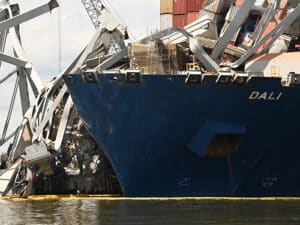
Isle of Man Ship Registry plans reduced fees for green ships
Written by Nick Blenkey
Cameron Mitchell, Director of the IOMSR: “If you are a shipping line making steps towards hitting IMO Greenhouse Gas (GHG) emissions targets, the Isle of Man flag will reward you.”
The Isle of Man Ship Registry (IOMSR) is set to become the first flag state in the world to offering reduced registration fees for ships using green technology.
The green discount will give ship owners a 15% reduction on their annual registration fee. The reduced fee is available to operators of cargo ships, commercial yachts or passenger ships who are investing in biofuel, alternative fuels, wind, or shore-side energy technology.
The registry is headquartered in Douglas on the Isle of Man, a self-governing British Crown dependency and the new green registration fee forms part of the Isle of Man Government’s Merchant Shipping (Fees) Regulations 2022, which will be submitted to Tynwald, the legislature of the Isle of Man, for approval at its sitting in March 2022.
“The IOMSR is a progressive flag state and we are looking at ambitious ways to take action on the decarbonization agenda that make a difference,” says Cameron Mitchell, Director of the IOMSR. “There is so much debate in the sector regarding which alternative fuels will be best in the future which conversely can create confusion and delay innovation. We want to jump start work in this area with this new green registration fee and state clearly that if you are a shipping line making steps towards hitting IMO Greenhouse Gas (GHG) emissions targets, the Isle of Man flag will reward you. We want to welcome more new, greener ships to our fleet.”
The IOMSR green registration fee applies to vessels which can provide evidence of one of more of the following:
- using biofuel or biofuel blends as the primary source of fuel for a period of not less than 120 days during the 12 months preceding April 1, 2022;
- ability to use alternative fuel – liquefied natural gas (LNG), liquefied petroleum gas (LPG), methanol, ammonia, hydrogen, hydrogen enriched fuel, fuel cells, or battery systems;
- ability to use wind assisted propulsion or wind energy for power generation; or
- ability to use shore-side energy to provide continuous electrical power to its equipment while it loads or unloads its cargo at berth with its main and auxiliary engines turned off (cold ironing).




